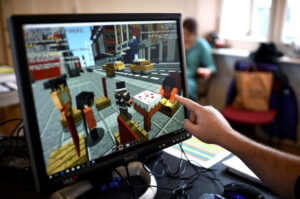Back to: Computer Science JSS 3
Welcome to class!
In today’s class, we shall be talking about the reasons for playing computer games. Please enjoy the class!
Computer Games – Reasons for Playing Computer Games

Computer games have become an undeniable part of our lives, with millions immersing themselves in their vibrant worlds every day. But what drives this fascination? Why do we dedicate hours to exploring virtual landscapes, solving puzzles, and battling enemies? Let’s delve into the captivating reasons why people play computer games:
- Escape and Relaxation:
Imagine soaring through the clouds as a majestic dragon, or conquering a fearsome foe in a medieval arena. Games offer an escape from the mundane, allowing us to step into fantastical roles and experience thrilling adventures. They provide a break from daily pressures, a chance to unwind and recharge in a world of our own choosing.
- Challenge and Skill Development:

Games aren’t just about mindless entertainment; they often present intricate challenges that demand strategic thinking, quick reflexes, and problem-solving skills. Overcoming these hurdles provides a sense of accomplishment and boosts our confidence. Whether it’s mastering a complex combo in a fighting game or deciphering a cryptic puzzle in an adventure game, the thrill of overcoming obstacles is a major motivator for many players.
- Social Connection and Community:
Games are far from solitary experiences. Multiplayer games connect us with friends and strangers alike, fostering teamwork, communication, and collaboration. We forge bonds over shared goals, celebrate victories together, and learn from each other’s strategies. Online communities built around specific games provide a sense of belonging and allow us to connect with like-minded individuals who share our passion.
- Creativity and Expression:

Games can be a platform for creative expression. Open-world games allow us to build our own virtual worlds, design our characters, and tell our own stories. Sandbox games provide endless possibilities for experimentation and exploration, letting us unleash our inner architects, artists, and storytellers. The freedom to express ourselves within the limitless boundaries of a game world is a powerful draw for many players.
- Learning and Education:
Games can be powerful tools for learning and education. Educational games can teach us about history, science, and even languages in a fun and engaging way. Strategy games can hone our critical thinking skills, while puzzle games can improve our problem-solving abilities. Games can also be used to simulate real-world scenarios, allowing us to practice skills and gain knowledge in a safe and controlled environment.
These are just a few of the many reasons why people play computer games. Whether it’s seeking escape and relaxation, challenging ourselves, connecting with others, expressing our creativity, or even learning something new, games offer a diverse and enriching experience that resonates with people of all ages and backgrounds. So, the next time you pick up a controller or click your mouse, remember the myriad reasons why we love to play – it’s more than just entertainment; it’s a journey into a world of possibilities.
We have come to the end of today’s class. I hope you enjoyed the class!
In the next class, we shall be discussing Types of computer games.
In case you require further assistance or have any questions, feel free to ask in the comment section below, and trust us to respond as soon as possible. Cheers!
Question Time:
Objective Questions:
- Identify the MAIN reason why the following individuals might play computer games:
- a) A student facing stressful exams
- b) A shy teenager struggling to make friends
- c) A professional athlete recovering from an injury
- d) A retired senior looking for mental stimulation
- e) An aspiring architect wanting to experiment with design (5 marks)


